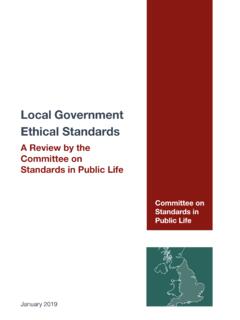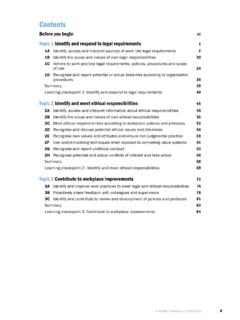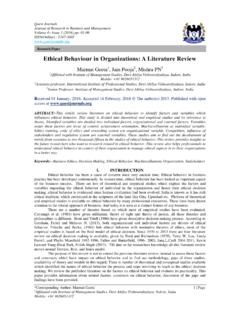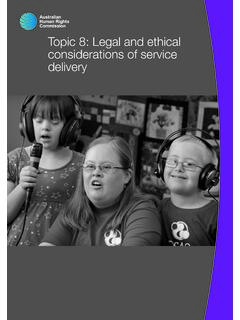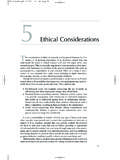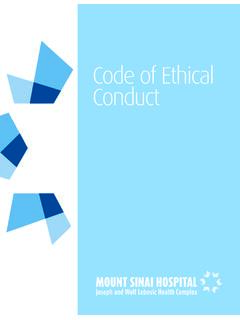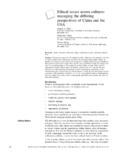Transcription of International Journal of Management & Information Systems ...
1 International Journal of Management & Information Systems Fourth Quarter 2010 Volume 14, Number 5 31 ethical Leadership Katarina Katja Miheli , Msc, University of Ljubljana, Slovenia Bogdan Lipi nik, Phd, University of Ljubljana, Slovenia Metka Tekav i , Phd, University of Ljubljana, Slovenia ABSTRACT The paper examines the construct of ethical leadership. ethical leaders think about long-term consequences, drawbacks and benefits of the decisions they make in the organization. They are humble, concerned for the greater good, strive for fairness, take responsibility and show respect for each individual.
2 ethical leaders set high ethical standards and act in accordance with them. They influence ethical values of the organization through their behaviour. Leaders serve as role models for their followers and show them the behavioural boundaries set within an organization. They are perceived as honest, trustworthy, courageous and demonstrating integrity. The more the leader walks the talk , by translating internalized values into action, the higher level of trust and respect he generates from followers. Keywords: ethical leader, character, leader-follower relations, ethical culture INTRODUCTION n spite of decades of discussions and research on ethical leadership the papers are largely anecdotal and remain highly normative (Brown & Trevino, 2006).
3 Until very recently little has been done to systematically develop an ethical leadership construct necessary for testing theory about its origins and outcomes (Brown, Trevino, & Harrison, 2005, p. 118). It is particularly in times of corporate scandals and moral lapses that the broader public and interest groups in a corporation ask themselves the fundamental question, namely, who are corporate managers and are they ethical . It is only in the recent years that managers and researchers have turned their attention to ethics Management (L. K. Trevino & Brown, 2005). The concern for ethical consciousness comes at the time when the concept of leadership legitimacy is questioned and when the public s trust in corporate governance is extremely low (Fulmer, 2005).
4 Leaders ought to be a crucial source of ethical guidance for employees and should at the same time be responsible for moral development in an organization. People might think that ethics is something intimate, a confidential matter that an individual and his conscience share. How we behave, how we reach goals (as long as they are legal and legitimate), might not seem important, and some might even say that ethics has nothing to do with Management . The truth s however just the opposite, ethics has a lot if not everything to do with Management /leadership. And managers behaviour is disseminated throughout the corporations and their behavioural standards are the crucial part of corporate climate, and when stabilized, culture.
5 The purpose of this paper is to shed light on the construct of ethical leadership by reviewing the relevant literature. The aims of the paper include providing definitions for the construct of ethical leadership and describing an ethical leader s personality. Furthermore, we evaluate the major determinants of leader s ethical behavior in an organization. The research questions of the paper include: what are crucial personality characteristics of an ethical leader and what is his typical behavior? What is the leader s role in fostering followers ethical behavior and how do followers perceive an ethical leader?
6 We also provide the results from scarce empirical studies about ethical leaders and the followers perception of ethical dimension in leaders. The structure of the paper reflects the purpose and follows the research questions. I International Journal of Management & Information Systems Fourth Quarter 2010 Volume 14, Number 5 32 ethical LEADERSHIP: DEFINING THE CONSTRUCT ethical leaders speak to us about our identity, what we are and what we can become, how we live and how we could live better. (Freeman & Stewart, 2006) Ethics is a philosophical term originating from Greek word ethos meaning custom or character.
7 It is concerned with describing and prescribing moral requirements and behaviors, which suggests that there are acceptable and unacceptable ways of behaving that serve as a function of philosophical principles (Minkes, Small, & Chatterjee, 1999). ethical behavior is defined as behavior which is morally accepted as good and right as opposed to bad or wrong in a given situation (Sims, 1992). Ethics is the code of values and moral principles that guides individual or group behaviour with respect to what is right or wrong. ethical behaviour is both legally and morally acceptable to the larger community (L.)
8 K. Trevino, 1986). ethical dilemmas though, are present in uncertain situations, in which different interests, values, beliefs pertaining to multiple stakeholders are in conflict. Narrowly, in an organizational context, ethics can be viewed as a frank conversation about those values and issues most important to stakeholders and to business. In a way, it is a continuous discovery and reaffirmation and evaluation of own values and principles (Freeman & Stewart, 2006). ethical behavior in organizational context has been most frequently described in terms of ethical standards of senior leaders (CEOs) and the culture to which they substantially contribute (DeGeorge, 1986).
9 We define leadership as the art of persuading a follower to want to do the things, activities, that the leader sets as goals. The role of leaders is therefore in the process of directing the individual s behaviour towards a desired goal. Leaders vary depending on the individual leadership style that stems from personality characteristics. Some leaders, particularly charismatic and transformational, have personal power through which they engage employees, whereas other exert the positional, legitimate power. Leaders are characterized by different values, attitudes, beliefs, conduct, habits and practices and that is to a certain extent dependent upon the organizational, professional or institutional culture.
10 Leadership signifies a relation between a leader and his followers within a situational and organizational context. According to insights and research by Rost leadership is defined as a power- and value-laden relationship between leaders and followers/constituents who intend real changes that reflect their mutual purposes and goals (Rost, 1993). Leadership in the context of normative organizational ethics would be defined with regard to how individuals should or ought to behave in an organization. This includes speculations about criteria that define ethical decisions and personality characteristics.





